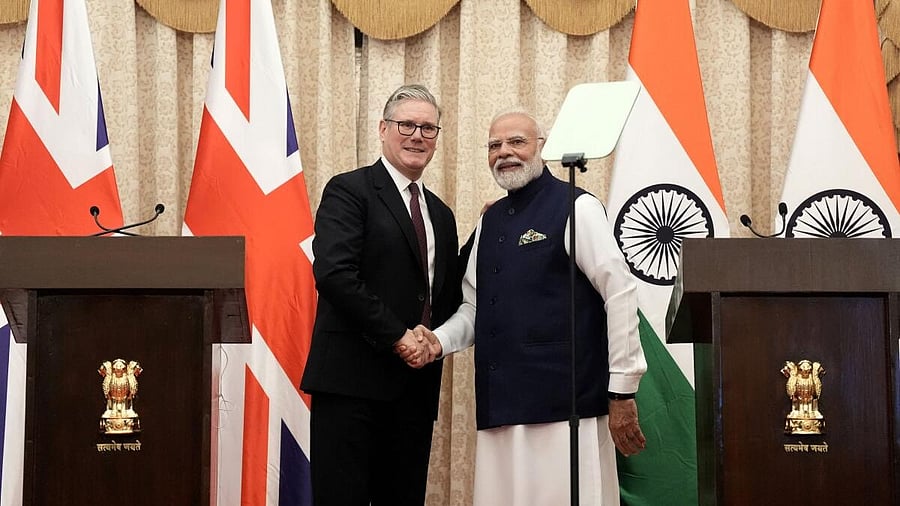
Keir Starmer shakes hands with Narendra Modi after delivering a joint statement in Mumbai
Credit: Reuters Photo
Mumbai: India and the United Kingdom are enhancing their defence and security ties to a new level by entering into the zone of co-production, cooperating in military training, increasing bilateral exercises between the armed forces, developing maritime electric propulsion systems, strengthening air defence and harnessing frontier technologies.
During the delegation-level talks and one-on-one interaction at the Raj Bhavan in Mumbai, Prime Minister Narendra Modi and his British counterpart Keir Starmer, who is on a two-day visit to India, took the Comprehensive Economic and Trade Agreement (CETA), signed in July, to a new level and signed the terms of reference to reposition the Joint Economic and Trade Committee.
This institutional reset is a game-changer, strengthening the framework for strategic engagement, driving the implementation of the India-UK CETA, and boosting the joint ambition to significantly enhance the bilateral trade.
Besides bilateral talks at the Raj Bhavan, Modi and Starmer, during the day, also jointly addressed the India–UK CEO Forum and the Global FinTech Fest at the Jio World Centre at the Bandra-Kurla Complex here.
During the talks, Modi was accompanied by National Security Adviser Ajit Doval, Commerce and Industries Minister Piyush Goyal and Vikram Misri, while Starmer had Business and Trade Secretary Peter Kyle and Minister of State for Investment Jason Stockwood.
Modi and Starmer agreed to expand bilateral exchanges between the armed forces of India and the UK through joint exercises, training and capacity building.
"Our defence cooperation has also deepened. We are moving towards defence co-production and connecting the defence industries of both countries," said Modi.
Both sides committed themselves to ensuring robust maritime security collaboration in the Indo-Pacific region, including the establishment of the Regional Maritime Security Centre of Excellence under the Indo-Pacific Oceans Initiative.
“We are fully committed to enhancing maritime security cooperation in the Indo-Pacific region,” said Modi.
In the context of cooperation on training, the two Prime Ministers welcomed progress on an arrangement that will see flying Instructors of the Indian Air Force integrated into the UK Royal Air Force training, alongside an agreement that will facilitate a strong training and education relationship.
There was also discussion to finalise an India-UK Inter-Governmental Agreement (IGA) on cooperation in developing maritime electric propulsion systems for Indian Naval platforms.
Both leaders also announced an agreement to proceed via government route on an initial supply of Lightweight Multirole Missile systems.
This will further support India’s air defence capabilities and, in the spirit of Atmanirbhar Bharat, meet the current and future requirements of the Ministry of Defence, and support a long-term collaboration on complex weapons between the two countries.
Incidentally, the visit of the UK trade delegation and the Mumbai deliberations coincided with the Exercise Konkan underway on the western seaboard, which includes participation of the Indian Navy aircraft carrier INS Vikrant and the Royal Navy aircraft carrier HMS Prince of Wales.
PMs condemns terrorism
Modi and Starmer unequivocally and strongly condemned terrorism and violent extremism in all their forms and manifestations and called for zero tolerance for terrorism and concerted international efforts to combat terrorism in a comprehensive and sustained manner, in accordance with the UN Charter and international law. They condemned in the strongest terms the April 2025 terrorist attack at Pahalgam in Jammu and Kashmir.
Modi and Starmer committed to strengthening cooperation to take decisive and concerted actions against globally proscribed terrorists, terror entities and their sponsors. Besides, the UK also supported India’s “legitimate aspirations” for permanent membership in a reformed United Nations Security Council (UNSC).
“India is a global player. We sit together in the Commonwealth, the G20, and we want to see India taking its rightful place on the UN Security Council too,” said Starmer.